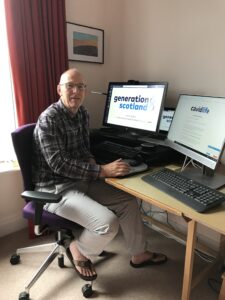Meet the Team: David

Hi, I’m David!
I am a Research Professor at the University of Edinburgh and I lead Generation Scotland. Generation Scotland is the big research idea I brought to the University when I joined in 1999. It is the research programme of which I am most proud and the note on which I will retire.
I am a geneticist by training. I love the elegance of genetics, the simplicity of the rules of inheritance written into DNA. Those rules derive from the properties of its structure – the double helix that is reflected in our Generation Scotland logo. The flip side to this elegance and our challenge now is to untangle the complexity that comes the sheer scale of the information content written into DNA. Take any two individuals and unless they are identical twins you expect to find one DNA letter change for every thousand. That adds up to around 3 million for each pairwise comparison!
I started out as a lab scientist. Doing your own experiments brings the immeasurable reward and excitement of being ‘the first’ to discover something new and perhaps important. But for every discovery there are many false turns and dead ends. I worked first on the human genome project, then helped pioneer gene therapy for cystic fibrosis and genetic science to understand the biology of major mental illness.
I still miss lab-based research, but for many years, I have been desk-bound. My role has been to develop good ideas and then persuade research charities or government agencies to pay for the staff and research costs! That all takes a huge amount of time, energy and resilience. It is a highly competitive process. The reward comes for the bright people that you recruit to explore, shape and improve the initial ideas through their hard work and talent. The rewards of team science are every bit as rewarding as those from my early years as a self-reliant scientist.
Variety is the spice of life and I have that in abundance. Every day starts with two task lists – one I set myself, the other set for me – by team members, external collaborators, report deadlines and the near constant need to raise funds. It is however a very unusual day that ends as it was planned! That can be frustrating and challenging, but is also an unusual day that doesn’t bring a new demand or reward, fresh stimulus for tomorrow!




Recent comments